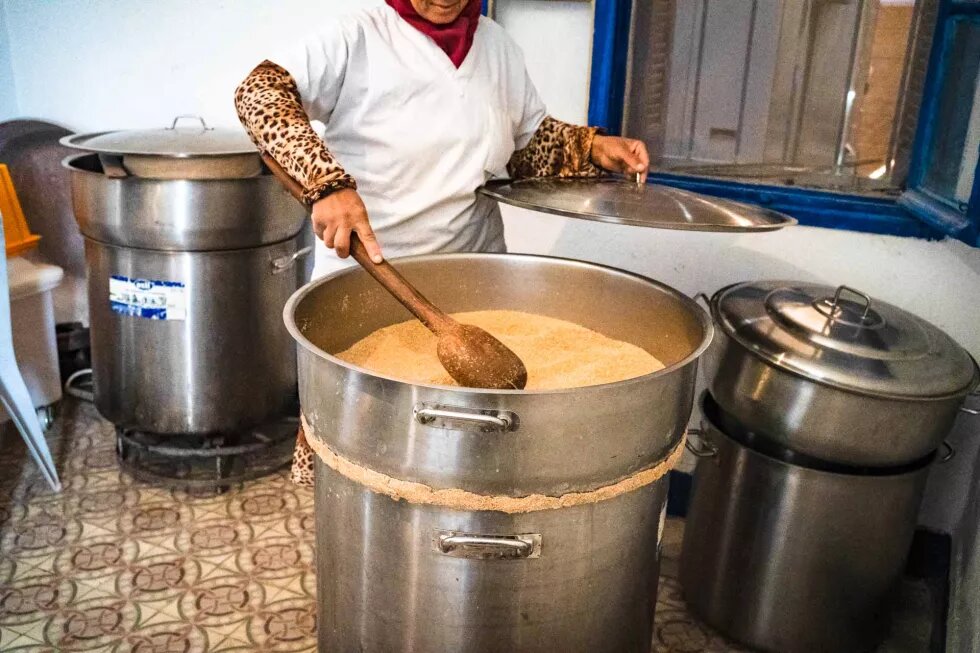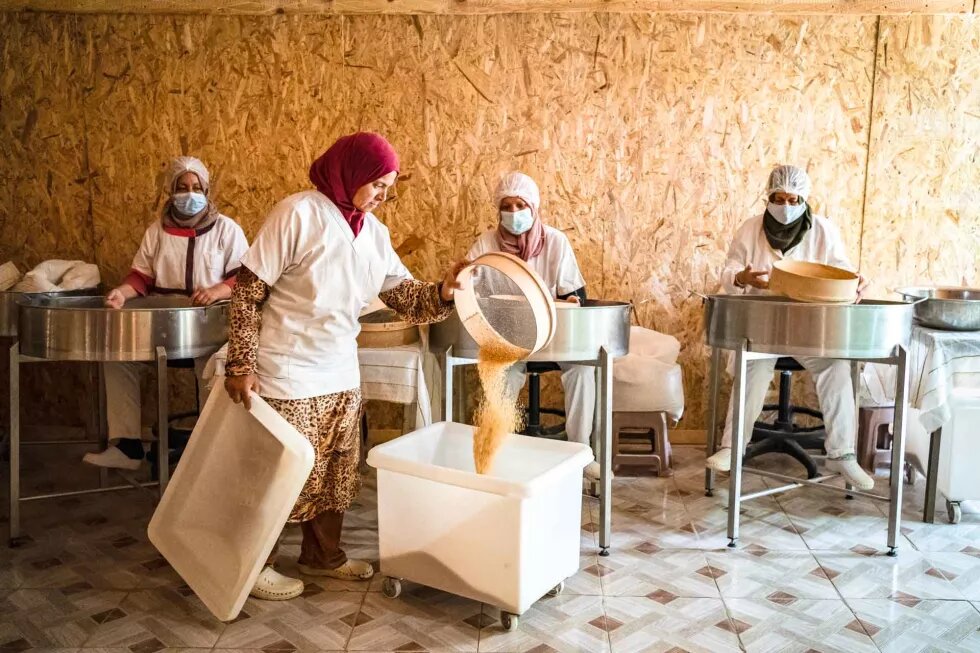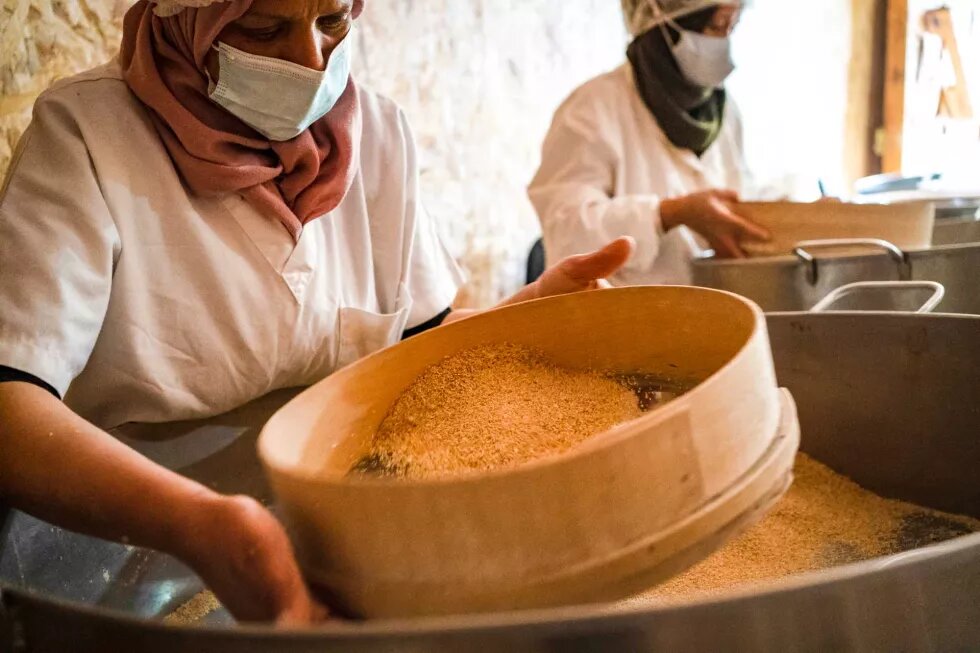
In Tunisia, indigenous and peasant seeds are discreetly exchanged between committed farmers and associations. They work together in a spirit of solidarity that is reminiscent of the commons, resisting the pervasive use of hybrid seeds.

El Aroussia, in the northwest of Tunisia, is home to a large wooden house nestled in the middle of a garden where a variety of plants are grown for essential oils. A dog is peacefully snoozing in the shade of one of the two large tables with white tablecloths, on which kilos of wheat semolina are drying in the sun. Inside, three women are busy rhythmically sifting the seeds using a sieve over a large metal vat.
At the bend of a dark and cool hallway, couscous is being cooked and a warm, salty and "delicious" bread is being made, as Laila Mastouri cheerfully described. She is the co-founder of the Lella Kmar association, which is housed on the premises. This cooperative grows mahmoudi wheat - a variety of durum wheat derived from indigenous Tunisian seeds - and then transforms it into semolina, flour, chorba (tiny pasta for soups) or bread.
"When people over 45 years old taste this stuff, they start crying. They say, 'This is like my mom's couscous’'” said Sophie Gombart, a consultant for the association. According to her, this feeling brings to mind the French expression "la madeleine de Proust", used to describe how "the day you feel the taste, you go back 40 years", she added with a smile.
Created in 2019, the cooperative counts 200 members "80% of whom are women," Laila Mastouri announced proudly. The association mainly works in agribusiness and the processing of indigenous seed-based products. "We now have about 330 hectares that are organically certified, including 160 hectares of wheat. The rest are olive trees and medicinal and aromatic plants," she added.
The cooperative supports farmers who own small plots of land - "only a few hectares" - in purchasing seeds and farming equipment. Most of the cooperative's producers are women from rural areas and young people. This initiative is aimed at "avoiding land abandonment," Sophie Gombart specified, and allowing them to save themselves from "a very critical economic situation."
The association encourages these workers to grow "seeds that are better adapted to the climate, to Tunisian soils" in order to produce seeds "that farmers can collect year after year," explained Laila Mastouri. The objective is to accompany farmers in their transition towards organic and indigenous seeds.
Indigenous VS Hybrids
The mahmoudi is an indigenous Tunisian seed: it "is not genetically stable: it mutates throughout its cultivation," explained Hedil Fraihi, agricultural engineer in the northern and central Governorates of the country.
Over the years, seeds go through "external, climatic or genetic mutations" in order to naturally adapt to their environment. Their natural evolution makes them more resistant to disease, climate change, or drought. Indigenous seed harvesting can therefore be quite unpredictable: the product may change in shape, taste, or even be unfit for consumption.
For a local seed, mahmoudi wheat is relatively stable "at about 90%," the agronomist pointed out, "but it's not always the same for every variety and species." Production and yields change by region, "including the quality of the cob, the shape of the seeds, etc."
Hybrid seeds, on the other hand, are the product of a cross between two types of seeds "each of which has specific and well-defined characteristics", Hedil Fraihi continued. Mixing these varieties is carried out in research centers and agronomy institutes in Tunisia and abroad, with the aim of defining the seeds' "desired characteristics", "whether in terms of color, shape, taste or smell".
Genetic stability is what farmers are looking for in hybrid seeds. "When you sow a [hybrid] seed, it grows exactly like the parent plant, as indicated on the package leaflet," said the engineer.
This is only guaranteed for the first generation of crops, however. Farmers are forced to purchase new seeds each year in order to get the desired volume and quality of yield.
"These hybrid seeds are sort of sterile, you can't reproduce them," warned Hedil Fraihi.
Hybrid seeds also require precise, technical instructions, "like a recipe," Hedil explained. "A technical itinerary of manure, fertilizers and well-designed treatments. In this way, the producer will have products with the same shape, the same quality, (...) but if one ingredient is removed from the magic formula, the product won't be as good as expected and there won't be any yield," she said.
Preserving the Tunisian heritage
The first hybrid seeds were introduced as a way to better meet both the French and European markets’ demands, according to Habib Ayeb, Tunisian researcher and geographer, and director of the documentary Couscous: Les Graines De La Dignité [Couscous: The Seeds Of Dignity] (2017).
In the 1960s, this policy was further strengthened by the World Food Programme (WFP), which distributed hybrid seeds, notably cereal seeds, to Tunisian farmers. Although yields were higher, this meant that farmers had to buy new seeds every year.
Note: Local seeds: a history of dispossession
The Tunisian cultivation has been transformed. Hedil Fraihi recalled a yellow watermelon she used to eat years ago, which can no longer be found today. "I don't know if it's totally lost or not," the engineer hesitated. One thing is certain: many ancestral seed species have disappeared, such as the Djeji watermelon from Sidi Bouzid or the 'Arbi' apple from Kasserine.
Note : ITES, “Le rôle de la Banque Nationale des gènes dans la conservation de la diversité biologique et la sécurité alimentaire en Tunisie,” mars 2019 [Tunisian Institute for Strategic Studies, “The National Gene Bank's role in biodiversity conservation and food security in Tunisia," March 2019”]
"We have lost a lot of seeds in Tunisia. Because of hybrids, no one cares about indigenous seeds," lamented Hedil Fraihi. Without proper conservation, indigenous seeds will become extinct.
A report conducted by the Tunisian Institute for Strategic Studies in 2019 found that 50 Tunisian local products across 14 Governorates are at risk of extinction, and 11 have already disappeared.
It was no accident that the Lella Kmar cooperative chose to grow mahmoudi wheat. They wanted to grow indigenous seeds, and that’s why they went with this variety, despite a "much lower" yield compared to other types of crops. This native seed is much more resistant to disease, and doesn't need fertilizers or any other chemicals. "The mahmoudi grows to about 1.70 to 1.75 meters tall when mature, which leaves plenty of straw for the animals. So any farmer would find it worthwhile," Sophie Gombart boasted.
To set this project in motion, the Lella Kmar cooperative was granted a loan from the National Bank of Genoa (BNG), based in Tunis. Each year, the institution distributes "a bag of seeds to the farmers with a contract of engagement requiring the producer to return them at the end of the campaign," Hedil Fraihi explained.
By rotating loans and indigenous seed donations, the BNG aims to preserve Tunisia's ancestral agricultural heritage and conserve some of these seeds, which aren't destined for exploitation. "They have huge labs where they can keep seeds in vacuum. [Indigenous seeds] are a treasure and a form of sovereignty," asserted Hedil Fraihi.
An age-old method
Over a hundred kilometers away, Saber Zouani cultivates his land on his farm in Cap Negro, on the Mediterranean coast. The young man is using native seeds to experiment with permaculture, drawing inspiration from his grandparents' practices.
"My father laughed at first, he said I was being silly and that it wasn't profitable," Saber Zouani laughed. "Now he's totally on board."
Saber took over his grandparents' farm in 2020 in a bid to become self-sufficient and produce in an ecologically sound manner. "Communicating with other farmers to find peasant seeds from my area was challenging," said Saber, "Most people around me use F1 seeds" which are hybrid seeds.
Saber and his family use traditional methods that they learned from their grandparents, "with clay, in the straws, or with ash," to store their seeds. "At each harvest, at the end of the season,I always save a portion of the chili peppers, for example, for conservation," Saber described. He leaves the seeds in the shade for a day, then mixes them with ash or clay and stores them in a tightly sealed glass box in a lightless room. "It works great, but it's not suitable for all seeds," Saber clarified.
To get indigenous or peasant seeds, he first turned to the Tunisian Association of Permaculture (ATP), a Tunisian NGO that works to promote peasant seeds throughout the country. With the help of ATP, Saber was able to exchange his own peasant pepper seeds for onion, squash and gombo (okra) seeds, etc.
Saber is simultaneously looking for trustworthy farmers to form a network. He pays attention to every little detail: the location of the land - which shouldn't be surrounded by fields that use pesticides - as well as the origin of the seeds, which must be 100% local. "There are imported peasant seeds" that aren't suited for the farming plot, he explained. Now that he has been able to form a solid group, they exchange seeds. Saber has also set up a subscription system for people looking to get his organic products, which brings him 400/500 dinars a month.
Drought, a looming threat
Unlike hybrid seeds, indigenous seeds are adapted to their climate, especially in terms of water requirements. Mahmoudi is much more adapted to the dry Tunisian terrain, Sophie Gombart affirmed, "Karim wheat for instance, or other common varieties in Tunisia give a yield that really drops catastrophically in the event of drought." She also used the example of rapeseed, a hybrid seed that is imported to meet the country's needs in vegetable oil.
Dekkaki M., Amssa M., Qariani L, "Identification of agro-physiological criteria for the adaptation of durum wheat to low temperatures and drought", 2000, CIHEAM (Available in French)
"Since December until today, I've been seeing rapeseed fields getting watered every day. We are completely past the red alert. We're really running out of water," the consultant warned.
In a statement issued on March 31, the Ministry of Agriculture banned the use of drinking water for the irrigation of farmland and green spaces, and for cleaning streets and public spaces until the end of September 2023. The National Company of Water Exploitation and Distribution in Tunisia (SONEDE) has introduced a system limiting water distribution at night and announced widespread cuts across the country.
This situation has been challenging for many farmers as Tunisia is undergoing its fourth consecutive year of drought. "We were already starting to feel the drought and the declining yields in the last two years. But there were rains in January that allowed us to recover. This time, there was nothing. So we can expect a food crisis," lamented Hedil Fraihi.
A lack of support from the State
For decades, the authorities have favored high water-consuming intensive agriculture based on hybrid seeds and have done nothing to promote the use of indigenous seeds.
According to the May 1999 law on seeds, Tunisia only recognizes seeds that are listed in a catalog established by the Ministry of Agriculture, more than 90% of which are hybrid seeds. This list is developed by the Government following criteria such as the seed's stability, its quality, and origin, but also and "above all, its yield," explained Hedil Fraihi.
According to Habib Ayeb, the authorities are "indirectly exerting control" over the use of native seeds, without banning them.
"There is no such thing as seed police (...) but if you use local seeds, you are not entitled to subsidies, credits, State aid, insurance. You get nothing, you have no protection," sighed Habib Ayeb.
This forces farmers seeking State support to grow officially catalogued hybrid seeds, rather than native peasant seeds. "Investors aren't really interested in producing anything outside the catalogs," Habib Ayeb continued.
But the current economic crisis in Tunisia has made the cultivation of hybrid seeds difficult, as they require chemicals and a lot of irrigation, not to mention their purchase cost.
"When you make peasants the poorest population in the country, you make peasant agriculture totally insufficient for people's daily survival," says Habib Ayeb.
When farmers sell their wheat to the state silos, it is subject to the quality and quantity criteria of conventional hybrid wheat and not those of indigenous mahmoudi durum wheat. These criteria, such as "the seed's shape, nutritional quality, color, etc." give value to soft wheat, Hedil Fraihi explained. Mahmoudi wheat seeds are larger, darker, and produce half the yield. "We can have 145 to 200 kilos per hectare of [mahmoudi] wheat against 400 kilos per hectare" for conventional wheat.
In this race for yield, and given the lack of state support, indigenous seeds can hardly find their place in Tunisian fields. To be cost-effective, the Lella Kmar cooperative would rather sell its organic products abroad, where they're in demand. "We need to make a living (...) Producing one kilo of couscous is very expensive compared to the Tunisian people's economic capacity. So we thought of doing some export", defended Laila Mastouri, the project's founder.
"We're not talking about agriculture, but agribusiness."
"The term agribusiness refers to maximizing production, regardless of ecosystems," commented Hedil Fraihi. When farmers buy hybrid seeds, they get caught up in the chemical treatment business. When providing their products, licensed seed companies also offer their "technical advice, which is purely oriented towards the use of chemicals, with no regard for the state of the soil", she denounced, "they treat the soil as if it were an inert substance".
However, the advice is not always adequate and, as a result, the products can severely damage the soil and the crop.
According to Hedil Fraihi, the use of chemicals is not controlled. Some producers chemically treat their plants grown from diseased hybrid seeds and "harvest immediately afterwards," without waiting for the period indicated by the chemical manufacturers, to avoid losing damaged products.
"We should put an end to labeling products grown without pesticides as 'organic'. We should put labels on 'chemical' and therefore carcinogenic products," denounces Habib Ayeb, referring to a person taking part in his documentary film.
Habib Ayeb believes that the problem is political and economic. He blames the demand for yield, which neither the local Tunisian seeds nor the old food production methods can meet. "There is a religion that was born with capitalism and the expansion of consumer markets and productivism: it is the yield religion," he criticized
As such, even if all Tunisian farmers were to start growing peasant seeds, like Lella Kmar or Saber Zouani, it wouldn't be enough to solve the structural crisis in the Tunisian agricultural sector. "I’m not against hybrids. Even peasant seeds have some limits," added Hedil Fraihi.
"It's a painstaking job and most producers and farmers don't have that technical knowledge," commented Hedil Fraihi. "We need to start by informing consumers and farmers," confirmed Saber, "There is a major problem of communication about peasant seeds throughout the country. I would like to see the State gradually encourage farmers to work with [peasant seeds] (...) It's a whole way of life," he concluded.
Graines ancestrales en Tunisie, un enjeu d’avenir
Author : Julia Terradot
Editing : Haïfa Mzalouat
Photos : Julia Terradot
This article is part of a partnership with the Heinrich Böll Foundation on the concept of commons.
This article was written using gender-sensitive grammar.






